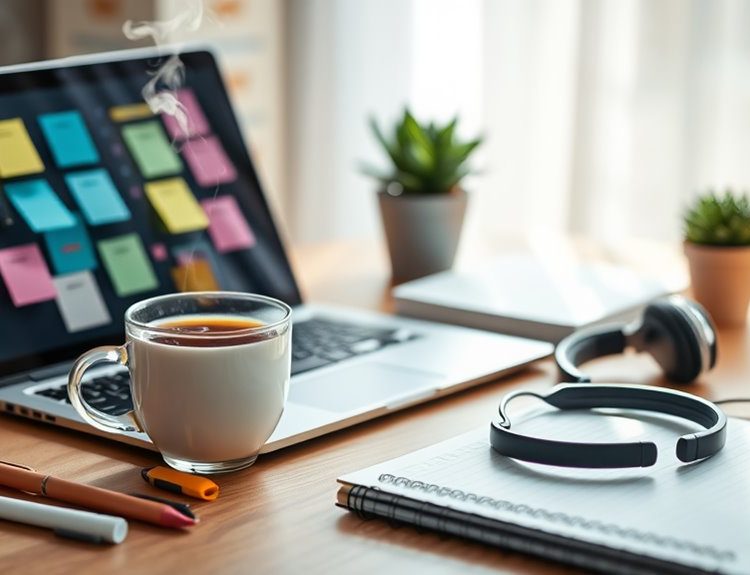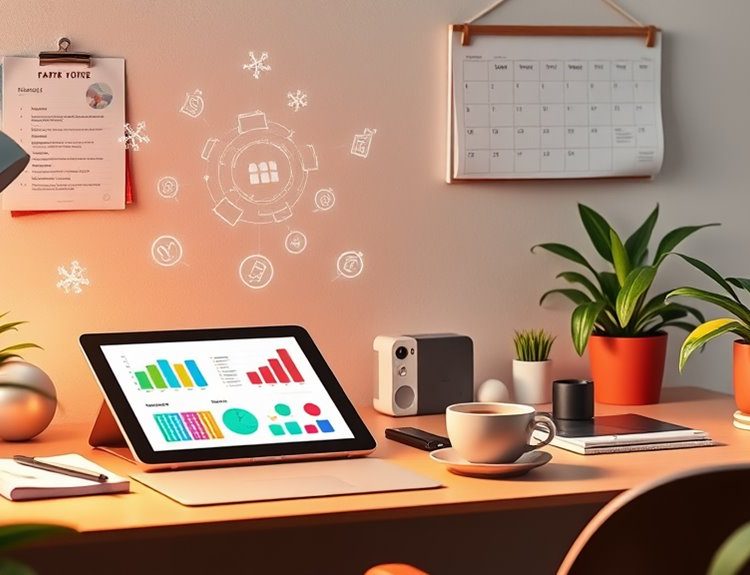Focus Hacks for People Who Get Distracted Too Easily
To boost your focus, start by identifying what distracts you—be it noise or visual clutter. Tidy your workspace to minimize distractions and adjust your lighting to natural sources when possible. Implement time-blocking by assigning specific slots for tasks, mixing deep work with breaks to recharge. Embrace digital minimalism by limiting apps and setting boundaries on social media use. Finally, infuse mindfulness into your routine with breathing exercises and meditation. This structured approach helps combat distractions effectively. Keep exploring these techniques to access even more strategies for maintaining your focus and productivity.
Key Takeaways
- Identify and eliminate environmental distractions by decluttering your workspace and minimizing noise levels.
- Utilize time-blocking techniques to allocate focused periods for deep work and schedule regular breaks.
- Embrace digital minimalism by removing distracting apps and setting boundaries on screen time.
- Practice mindfulness through breathing exercises and meditation to enhance mental discipline and concentration.
- Personalize your workspace with inspiring yet simple items to foster motivation without causing overwhelm.
Understanding Distraction Triggers
When you’re trying to focus, distractions can pop up unexpectedly, often tied to specific triggers in your environment.
You might notice that certain sounds, like a ringing phone or loud conversations, pull your attention away. Visual distractions, such as cluttered desks or bright screens, can also make it hard to concentrate.
Even your own thoughts can act as triggers; stress about deadlines or personal issues can hijack your focus. Recognizing these triggers is essential.
When you identify what pulls you away from your tasks, you can begin to manage these distractions effectively. By keeping a journal or simply being aware of your surroundings, you’ll better understand your unique triggers and develop strategies to minimize their impact on your concentration.
Optimizing Your Environment
Recognizing your distraction triggers is just the first step; optimizing your environment plays a key role in enhancing focus.
Start by decluttering your workspace. A tidy area minimizes visual distractions and helps clear your mind.
Adjust your lighting to reduce strain and create a comfortable atmosphere. Natural light boosts mood, so open those curtains if possible!
Consider noise levels too; use noise-canceling headphones or soft background music to drown out disruptive sounds.
Personalize your space with items that inspire you, but keep it simple to avoid overwhelm.
Finally, establish a designated work zone. This physical separation signals your brain that it’s time to concentrate.
Mastering Time-Blocking Techniques
To enhance your focus and productivity, mastering time-blocking techniques can be a game changer. By allocating specific periods for tasks, you’ll minimize distractions and work more efficiently. Here’s a simple breakdown of how to implement it:
| Block Type | Example Tasks |
|---|---|
| Deep Work | Writing, Coding |
| Shallow Work | Emails, Meetings |
| Breaks | Lunch, Short Walks |
Start by identifying your most important tasks for the week. Then, create blocks in your calendar, ensuring you stick to them. Remember, it’s crucial to include breaks for rejuvenation. This structured approach helps you stay accountable and focused, reducing the urge to multitask.
Embracing Digital Minimalism
As you navigate a world filled with constant notifications and endless content, embracing digital minimalism can greatly enhance your focus.
Start by decluttering your digital space; remove apps that distract you and limit your social media usage. Set boundaries on your screen time, allowing only essential tasks during your day.
Curate your content consumption—follow only those accounts that truly add value to your life. Consider using tools like website blockers to help you resist temptation.
By simplifying your digital environment, you’ll reduce cognitive overload and regain control over your attention.
Implementing Mindfulness Practices
How can mindfulness practices transform your ability to focus? By incorporating mindfulness into your daily routine, you train your mind to stay present.
Start with simple breathing exercises; just a few minutes can ground you. When distractions arise, acknowledge them without judgment, then gently redirect your attention back to your task.
Try to incorporate mindful moments throughout your day, like taking a short walk or savoring your meals, which helps reinforce your focus.
Additionally, consider meditation; even a few minutes each day can enhance your concentration over time.
By integrating these practices, you develop a stronger mental discipline, making it easier to tune out distractions and engage fully in whatever you’re doing.
Mindfulness isn’t just a technique; it’s a way of life.
Frequently Asked Questions
How Do Distractions Affect Productivity in Different Work Environments?
Distractions can greatly hinder your productivity, varying by work environment. In open spaces, noise and movement may disrupt your focus, while remote settings might lead to interruptions from family or technology, impacting your efficiency.
Can Diet Influence My Ability to Focus?
Yes, your diet can greatly influence your ability to focus. Eating balanced meals with sufficient nutrients fuels your brain, while excessive sugar or processed foods might lead to energy crashes and distractibility. Choose wisely for better concentration!
What Role Does Sleep Play in Distraction Levels?
Sleep notably impacts your distraction levels. When you’re well-rested, your concentration sharpens, allowing you to stay engaged. Conversely, lack of sleep leads to fatigue, making it harder to focus and increasing your susceptibility to distractions.
Are There Specific Apps to Help Minimize Distractions?
Yes, there are several apps that can help you minimize distractions. Tools like Forest, Freedom, and StayFocusd block distracting sites and encourage productivity, so you can stay on track with your tasks more effectively.
How Can I Train My Brain to Stay Focused Longer?
To train your brain to stay focused longer, practice mindfulness techniques, set specific goals, and gradually increase your attention span through timed tasks. Break work into manageable chunks and reward yourself after each accomplishment.



